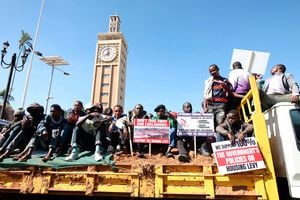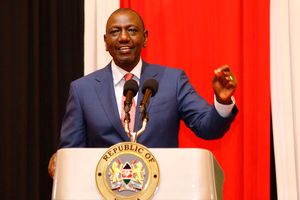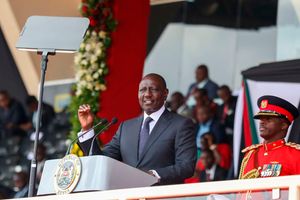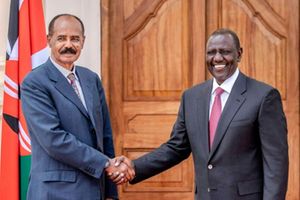
President William Ruto inspecting the ongoing affordable housing project in Kibera Highrise, Langata Constituency in Nairobi on November 22, 2023.
President William Ruto’s publicly stated promise to construct at least 250,000 affordable housing units every year might as well be a pipe dream that appears to be at variance with figures provided in documents by the State Department for Housing and Urban Development.
The Sunday Nation has pored over the numbers and projections provided by the Housing Department in the latest Sector Working Report, which indicates ministry officials working on the affordable housing programme do not expect more than 1,400 housing units to be completed in each of the three fiscal years starting July 2023.
This perhaps indicates the gulf between economic reality on the divisive programme, which was started by President Uhuru Kenyatta’s administration that also dismally fell short of the 5 million target by the end of his second term in 2022.
President Ruto has made it his flagship project with the promise to deliver 250,000 affordable houses annually using housing levy funds deducted from salaried workers.
The plan has, however, been halted by the courts and declared unconstitutional in a legal battle that has now reached the Court of Appeal.
However, in the current Financial Year ending June, the housing department expects only 320 housing units to be completed, with a big chunk being affordable housing units for both the low-income households and the middle class.
This is expected to increase to 525 in the 12 months to June 2025, according to projections by the housing department in a National Treasury report.
Also Read: State moves to widen housing levy net
In the fiscal year 2025/26, a total of 1,060 cheap houses are projected before increasing further to 1,330, but still a far cry from the annual target of 250,000 housing units, in the period ending June 2027.
Indeed, the State Department’s pipeline of cheap houses to be built or facilitated by the government between July 2023 and June 2027 according to the Sunday Nation’s tabulation of the figures provided — and which include affordable housing for the middle class, social housing units for those who live in slums, houses for police and prison officers and units for civil servants — add up to 191,968.
In the report, however, the State Department gives a slightly higher figure of 197,073 decent shelters that are to be constructed by the end of June 2027.
“Construct 151,081 affordable and 40,992 social housing units; Construct 5,000 hostel units in higher learning institutions,” says the housing department.
In total, the government projects to spend at least Sh242.4 billion building these affordable houses, access roads to these housing projects as well as connecting them to the electricity grid.
Asked why there was a huge variance between the figures captured in the Sector Budget Proposal Report and that which has been given to the public by State officials, including by President Ruto, the Principal Secretary for Housing and Urban Development Charles Hinga, attributed this to the fact the tally did not include houses being built under the Public Private Partnership (PPP).

Principal Secretary State Department for Housing and Urban Development Mr Charles Hinga during a past event.
Mr Hinga attributed the variance to the fact that the sector budget report deals with only what is appropriated by Parliament.
“Our housing programme has units built via budget and the balance is built through PPP (Public Private Partnership),” said Mr Hinga.
“The ones via PPP don’t make it to the sector budget report as they use private capital not budget,” added Hinga.
However, our tally includes affordable houses to be built under the Constituency affordable housing programme under which the government plans to facilitate the building of a total of 100,000 units.
One such project, a PPP, was launched by President Ruto in Starehe, Nairobi, where GulfCap Africa, chaired by businessman-cum-politician Suleiman Shahbal, plans to build 6,704 low-cost houses, including 2,000 social units. The project is a joint venture between GulfCap Real Estate, owned by GulfCap Africa Limited, and the Government.
“An investor is a person who believes in the country. I am encouraging other investors to step forward and partner with the government in this course. I thank you Suleiman Shahbal. Some people get a little money and immediately run to Dubai to buy flats,” said President Ruto during the ground breaking ceremony in Kariakor, Nairobi, in March last year.
Besides the Starehe project, which falls under the Constituency Development Affordable Housing, the government also plans to build another 91,968 affordable units in other places.
This includes 605 units in Bondeni, Nakuru; 1,728 in Nairobi’s Shauri Moyo, A, 4,556 in Shauri Moyo B and another 2,420 in Starehe.
In Mavoko, Athi River, the target is 5,360 housing units, and in Thika and Ruiru, both in Kiambu, 975 and 1050 respectively.
The National Housing Corporation (NHC), a state corporation, has been tasked with building 11,800 housing units and another 5,000 hostels for students in institutions of higher learning.
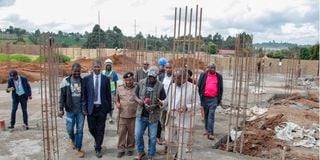
A multi-agency team from the national and Nakuru County governments during an inspection tour of the ongoing affordable housing project in Elburgon, Nakuru County on Thursday, December 14.
In total, the government plans to spend a total of Sh127 billion on the construction of affordable housing units, a plan that was started by the Jubilee administration as part of the Big Four Agenda.
By the end of June last year, the government had spent Sh4 billion on this programme which is expected to be completed in 2032.
Prices for these affordable housing units will range from a 1 bedroom unit of Sh1.5 million to a 3 bedroom unit of Sh4 million in Bondeni, Nakuru Municipality.
In the review period, between July 2024 and June 2027, the plan is to build 40,992 social housing units. However, the goal is to eventually develop 100,000 social housing units in Kibera B, Mariguini, Kiambiu Nairobi and Mukuru Slums at an estimated cost of Sh49 billion.
So far, Sh6.88 billion have been spent on the development of social housing units which is part of the government’s slum upgrading program.
Around 1,000 social housing units will also be developed in Mavoko, Athi River, under the Mavoko Sustainable Neighbourhood Project - Mlolongo, at an estimated cost of Sh3 billion. The project, with an end-date of 2028, had already consumed Sh1.4 billion by the end of the last fiscal year.
Following years of living in dilapidated shelters, the State plans to build 10,500 houses for the police and prison officers at a total cost of Sh25,000. Construction of these decent houses for the disciplined forces is ongoing with the government having spent Sh7.3 billion by the end of June last year.
Civil servants will also be beneficiaries of the government’s goal of providing decent housing to every Kenyan, with the State estimating that it will need Sh20.6 billion to build 6,100 units for the government workers. By the end of June, the government had spent Sh5.3 billion constructing houses for civil servants, though a lot of them have benefited from a mortgage facility, said the housing department.
The Ruto administration has since reconfigured the Affordable housing Programme into three bands of social, affordable and market housing units, in what is aimed at absorbing even those who earn over Sh150,000 a month, a category of workers that had been left out in the initial plan by the former government.
By the end of June last year, only 1,297 affordable housing units had been built, the majority of them, about 882, in Parkroad, Nairobi.



